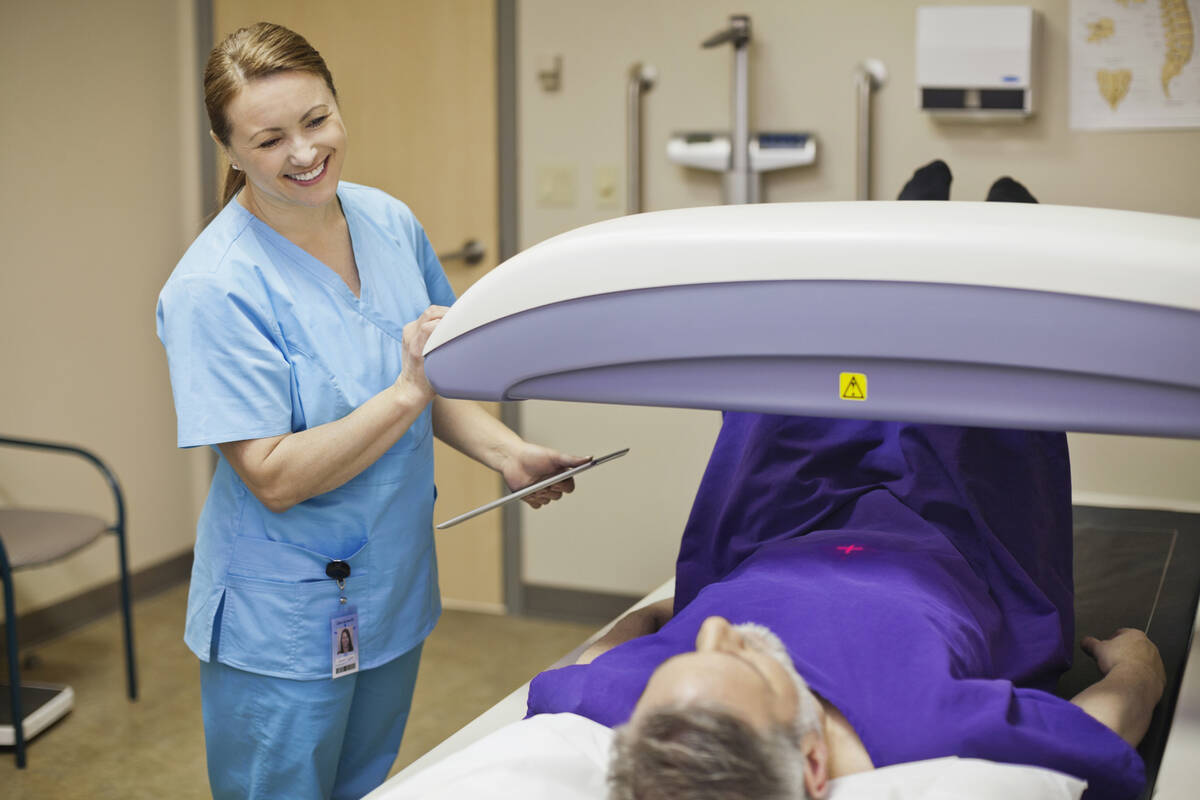Osteoporosis risk dictates need for bone density test
Question: I am 62-year-old woman who has been fairly healthy most of my life. I try to walk daily and eat right. I’ve never had a fracture or bone health issues. But after my annual physical this year, my doctor suggested a bone density test. Do I really need one and how often?
Answer: A bone density test uses a low dose of X-rays in a quick, noninvasive way to measure the amount of calcium and other minerals in a segment of bone, usually the hips and spine. By identifying decreases in bone mineral density, your health care provider can determine your risk of fractures and diagnose and monitor osteoporosis progression.
Most young, healthy people do not need a bone density test. But as you age, your risk for osteoporosis increases because bone density tends to decrease as people grow older. That is especially true in women. If you are a woman 65 or older, a bone density test is recommended, with a repeat test generally performed two years after the initial test, although this interval may change depending upon any treatments being administered.
For women under 65, bone density tests may be recommended based on risk factors for osteoporosis, such as a family history of the disease or a history of fractures.
For men without fractures, the answer isn’t quite as clear. The U.S. Preventive Services Task Force doesn’t recommend routine bone density testing for men. Because men have a higher bone mass and lose bone more slowly than women, they’re at a lower risk of fracture. However, up to 1 in 4 men over 50 will break a bone due to osteoporosis. Groups such as the National Osteoporosis Foundation still recommend testing for men 70 and older. Men 50 to 69 also may consider testing if they have risk factors for osteoporosis.
People over 50 who have broken a bone and people who have lost 1.5 inches of height or more also may need a bone density test to screen for osteoporosis.
Another risk factor for osteoporosis is taking certain kinds of drugs that can interfere with the body’s process of rebuilding bone. Examples of these drugs include steroid medications, such as prednisone, and immunosuppressant medications, such as those taken after organ or bone marrow transplants.
Bone density test results are reported in a measurement known as a “T-score.” A T-score of minus 1 or higher is normal. A score of minus-2.5 or lower is osteoporosis. The range between normal and osteoporosis is considered osteopenia, a condition where bone density is below the normal range and puts a person at higher risk for developing osteoporosis. Osteopenia also raises the risk for breaking a bone.
There are things you can do to help keep your bones healthy as you get older. Exercise is important. Be sure to include a combination of weight-bearing exercises, such as walking, jogging, running or stair climbing. Eat a healthy diet, making sure to get the right amounts of calcium and vitamin D. And if you smoke, stop. Research suggests that tobacco use contributes to weak bones. Similarly, regularly having more than two alcoholic drinks a day raises your risk of osteoporosis, possibly because alcohol can interfere with the body’s ability to absorb calcium. Therefore, limit the amount of alcohol you drink.
Talk to your health care provider about getting a bone density test, and discuss with him or her any concerns you have about your bone health. Taking steps now can help ensure good bone health in the future.
Dr. Jeremiah Long is a diagnostic radiologist with the Mayo Clinic in Phoenix.

















